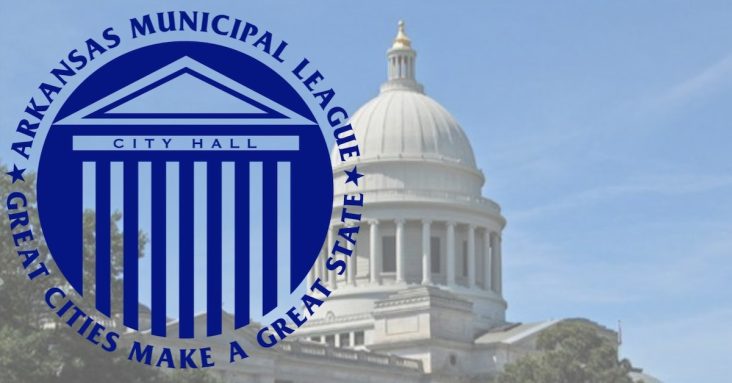AML legislative roundtable includes retail incentives, red light cameras
by September 24, 2024 3:42 pm 291 views

Hot topics during an Arkansas Municipal League (AML) legislative roundtable held Tuesday (Sept. 24) with representatives of cities in the Fort Smith metro included incentives for economic development, sales tax collections and red light traffic cameras.
The roundtable was held at the Peak Innovation Center in Fort Smith.
John Wilkerson with AML said as the agency prepares for the 2025 Arkansas Legislative session, it realized the most beneficial thing it could do was to sit down with city leaders and hear from them what is good for the state and for the communities. One of the key topics AML will focus on during the legislative session is economic development, Wilkerson said.
“The first thing we want to focus on is enhancing our ability to incentivize economic development activity. One big way to do that is by adding retail to the list of entities that can be incentivized with state funds,” he said.
RETAIL INVESTMENT
An Arkansas constitutional amendment, approved by voters in 2016, allows cities to invest money or incentivize economic development that creates jobs.
In 2017, an act was passed that mirrors the amendment and added some barriers and guidelines, Wilkerson said. The list of projects that can receive the incentives are manufacturing, production and industrial facilities; research, technology and development facilities; distribution facilities; warehouse facilities; call centers; regional or national headquarters; or sports complexes. The one thing it doesn’t allow is incentivizing retail.
“And as many of you know, the No. 1 job creator in any town is going to be retail,” Wilkerson said. “A lot of you rely very heavily on retail, and it is a very big driver for economic development in the state of Arkansas.”
He said while the constitution does not allow retail to be incentivized, the law does.
“The constitutional amendment has to have the word retail in it,” Wilkerson said. “The law was changed in 2019 to allow retail as an economic development project. The constitution wasn’t changed. All we want to do this session is ask the legislature to add retail to the constitution and thus the list of ways we can incentivize economic development.”
Oklahoma allows retail for such incentives and by adding retail to the list in Arkansas, it will make it more competitive, he said.
“Adding retail would be a big deal for smaller communities,” said Gary Baxter, mayor of Mulberry, who also said further defining all the categories would be a big help.
Fort Smith City Director Lavon Morton said there needs to be guardrails that protect where sales tax is concerned. If a retail business does not have to pay city sales tax for a period of time, it automatically gives them a 2% advantage over every other retailer in the city, Morton said, noting that retail margins are very thin and a 2% advantage would not be fair.
REDUCING COLLECTION FEES
AML also wants the Department of Finance and Administration to rethink the 3% collection fee it keeps on sales tax collected for the cities
“We’re of the opinion that it is probably easier to process this sales tax and give back than in 1977, and 3% seems to be a large amount of money,” Wilkerson said.
That 3% equates $31 million collected by the states across all cities and towns, he said. A quick breakdown showed that the Department of Finance keeps approximately $1.8 million of Fort Smith’s sales tax annually. For Mountainburg, that number is $6,000; Mulberry is $14,000; Greenwood $130,000; and Altus is $3,000.
AML would like to see that fee cut to 1.5% or to perhaps go down by 0.25% each year, but it has been met with resistance. The money does not go into the state’s general fund but rather to state social services or the congressional fund. Wilkerson said they are hoping they can get more backing for a plan to take half of the collection fee and give it to the Arkansas Natural Resource Commission with those funds earmarked to go back to cities and towns that need help with their water systems.
RED LIGHT CAMERAS
AML also is pushing to legalize red light cameras that can catch violators who run red lights.
“The gut reaction is, ‘no, this won’t work.’ But there is room to work with this, we believe,” Wilkerson said.
The hope is that red lights can be added to the list of places where the state allows cameras to catch traffic violators and notify highway patrol ahead, such as work zones, school zones and railroad crossings.
State Rep. Jay Richardson, D-Fort Smith, has tried twice to introduce red light camera legislation, and both have died “a painful death,” he said Tuesday. He said the main concern is not wanting “big brother” watching all the time”
“Maybe add to the existing list will at least get us in the doorway,” Wilkerson said, noting that reducing the number of drivers who are running red lights would reduce the number of t-bone traffic accidents, which are the most deadly.
AML is also looking at backing possible legislation that would allow smaller towns the ability to use street turnback funds they might not need for streets for other emergencies if an emergency can actually be proven.
“There is a push by a handful of legislators that if you suffer an emergency situation you can do so without penalty,” Wilkerson said.
